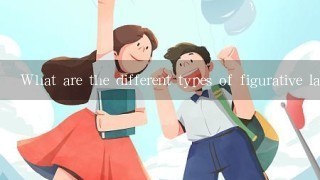What are the different types of figurative language?

Sure, here's a breakdown of the different types of figurative language:
1. Simile:
- A simile is a comparison between two things that are alike in some way.
- For example, "Her eyes were as bright as the stars" or "His heart was as strong as an ox."
2. Metaphor:
- A metaphor is a comparison between two things that are not alike in some way.
- For example, "The world is a stage" or "Her love was a rose."
3. Personification:
- Personification is when an object or idea is given human characteristics.
- For example, "The wind whispered secrets through the trees" or "The sun smiled down on the city."
4. Hyperbole:
- A hyperbole is an exaggeration.
- For example, "I'm starving to death" or "I'm so thirsty, I could swim."
5. Understatement:
- An understatement is a statement that is less than the truth.
- For example, "It was raining" when it was actually cloudy.
6. Oxymoron:
- An oxymoron is a figure of speech that combines two opposite words.
- For example, "deafening silence" or "bitter sweet."
7. Idiom:
- An idiom is a group of words that has a meaning that is not equal to the sum of the meanings of the individual words.
- For example, "kick the bucket" or "break a leg."
8. Symbolism:
- A symbol is a thing that represents something else.
- For example, the cross is a symbol of sacrifice.
9. Rhetorical question:
- A rhetorical question is a question that is asked for effect, rather than to get a factual answer.
- For example, "Do you love me?" or "Are you happy?"
10. Paradox:
- A paradox is a statement that is logically impossible to be true.
- For example, "The sky is blue and the sun is shining."





































































